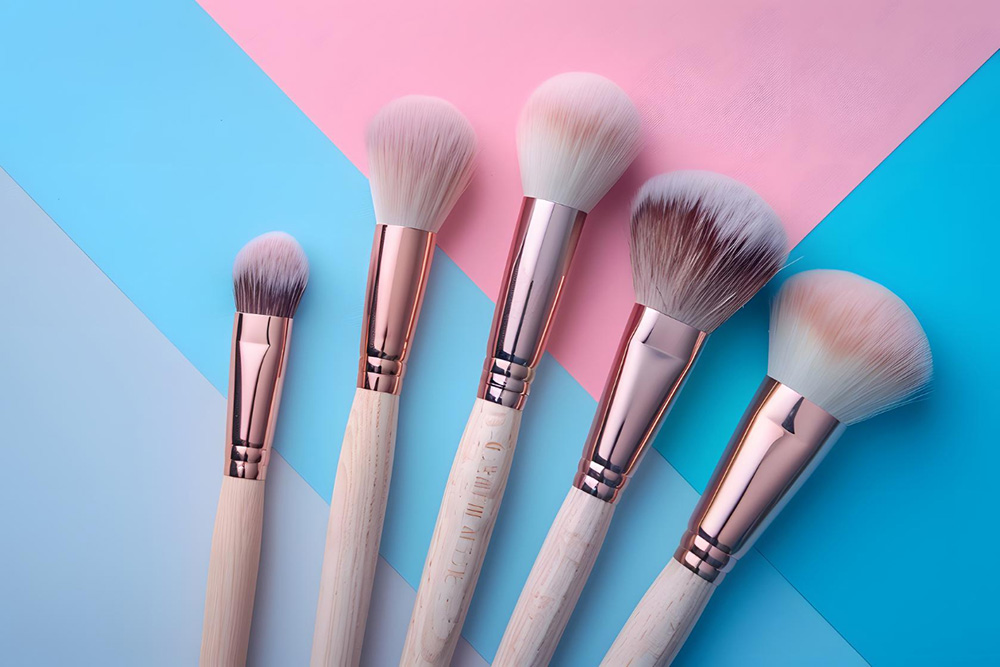Exploring Natural vs. Synthetic Makeup Brushes: Which Is Right for You? September 4, 2024

Choosing the right makeup brush can make a world of difference in your makeup application. With so many options available, one of the most common decisions to make is between natural and synthetic brushes. Each type of brush offers its own unique set of benefits, and the right choice depends on your makeup routine, skin type, and personal preferences. In this article, we’ll explore the differences between natural and synthetic makeup brushes, helping you decide which is right for you.
What Are Natural Makeup Brushes?
Natural makeup brushes are made from animal hair, often from goats, squirrels, or horses. These brushes are popular for their soft texture and ability to pick up and blend powder products seamlessly. The cuticles of animal hair help grip onto powder, making natural brushes ideal for powder-based products like eyeshadow, bronzer, and setting powders.
Advantages of Natural Brushes
- Excellent for Powder Products: The structure of natural bristles allows them to hold onto powder more effectively than synthetic brushes, resulting in better product pickup and blending.
- Soft and Durable: Natural brushes tend to be softer and, with proper care, can last a long time.
- Better Blending: Natural brushes are often preferred by professional makeup artists for blending because they create a smooth, natural finish.
Drawbacks of Natural Brushes
- Less Suitable for Cream and Liquid Products: Natural hair absorbs liquid products, making it difficult to achieve a smooth application with cream or liquid foundations.
- Allergic Reactions: Some people may have allergies to animal hair, which can cause irritation when using natural makeup brushes.
- Ethical Concerns: Since natural brushes come from animals, some consumers are concerned about cruelty and animal welfare, even though many companies source their hair ethically.
What Are Synthetic Makeup Brushes?
Synthetic makeup brushes are made from man-made materials, typically nylon or polyester fibers. These brushes have become increasingly popular due to their versatility, affordability, and improved quality in recent years. Synthetic brushes are often used for liquid or cream products, but they are also effective with powders, depending on the brush’s design.
Advantages of Synthetic Brushes
- Perfect for Cream and Liquid Products: Synthetic bristles don’t absorb liquid or cream products, making them perfect for foundations, concealers, and cream blushes. They help spread these products evenly across the skin.
- Hypoallergenic: Since they are made from synthetic fibers, these brushes are less likely to cause allergic reactions, making them ideal for sensitive skin.
- Affordable and Widely Available: Synthetic brushes are generally more affordable than natural brushes and come in a wide range of options and designs.
- Animal-Friendly: Synthetic brushes are cruelty-free, making them a popular choice for vegan and ethically-conscious consumers.
Drawbacks of Synthetic Brushes
- May Not Blend Powders as Well: While synthetic brushes are improving, they may not be as effective as natural makeup brushes in picking up and blending powder products.
- Can Be Stiffer: Depending on the quality, synthetic brushes may feel stiffer or less soft compared to natural brushes.
Which Brush Is Right for You?
The choice between natural and synthetic brushes depends on a variety of factors, including the types of products you use, your skin sensitivity, and your personal values. Here’s a quick guide to help you decide:
- For Powder Products: If you primarily use powder-based products like eyeshadows, bronzers, and blushes, natural brushes may be the better option. They offer superior blending and help you achieve a flawless finish with powders.
- For Liquid and Cream Products: If your makeup routine includes a lot of cream or liquid products, synthetic brushes are the best choice. They won’t absorb the product, ensuring smooth and even application.
- Sensitive Skin: If you have sensitive skin or allergies to animal hair, synthetic brushes are the safer option. They are hypoallergenic and gentle on the skin.
- Ethical and Vegan-Friendly: For those concerned about animal welfare, synthetic brushes are the clear choice. They offer high performance without any involvement of animal-derived materials.
Combining Natural and Synthetic Brushes
In many cases, you don’t have to choose between one or the other—you can have the best of both worlds. Many makeup artists and enthusiasts use a combination of natural and synthetic brushes in their routine to maximize the benefits of each. For example, you might use natural brushes for your powder products and synthetic brushes for your liquid and cream products. This approach ensures that you’re using the best tool for each type of product, resulting in a flawless makeup application.
Conclusion
Whether you choose natural or synthetic makeup brushes depends on your makeup habits, preferences, and values. Natural brushes are excellent for powder products and provide superior blending, while synthetic brushes are ideal for liquid and cream products, as well as being more affordable and cruelty-free. Ultimately, the best choice is the one that works for you and helps you achieve your desired makeup look. By understanding the strengths and weaknesses of both types, you can build a brush collection that caters to your unique needs and ensures flawless makeup application every time.
